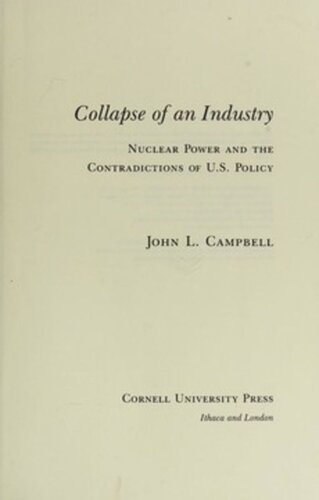

Most ebook files are in PDF format, so you can easily read them using various software such as Foxit Reader or directly on the Google Chrome browser.
Some ebook files are released by publishers in other formats such as .awz, .mobi, .epub, .fb2, etc. You may need to install specific software to read these formats on mobile/PC, such as Calibre.
Please read the tutorial at this link: https://ebookbell.com/faq
We offer FREE conversion to the popular formats you request; however, this may take some time. Therefore, right after payment, please email us, and we will try to provide the service as quickly as possible.
For some exceptional file formats or broken links (if any), please refrain from opening any disputes. Instead, email us first, and we will try to assist within a maximum of 6 hours.
EbookBell Team

4.1
30 reviewsThe commercial nuclear power industry was flourishing in the United States in the early 1970s; fifteen years later, the enterprise had collapsed. John L. Campbell examines the history of this debacle in order to explore how state and market shape each other under modern capitalism. In Collapse of an Industry, Campbell confronts controversial issues whose implications range far beyond the specifics of the nuclear power industry: the relative merits of free and controlled markets, the reliability of industrial planning, and the appropriate role of the state in managing economic activity. Ultimately, Campbell sheds light on the central question of whether modern democracy and capitalism may be essentially incompatible.
A complex, expensive, and potentially very dangerous technology, nuclear energy requires careful long-range planning to sustain commercial success. Campbell's narrative account shows how political and economic institutions unique to the United States made the nuclear energy industry particularly vulnerable to a series of policy failures that undermined that planning. Drawing on industry histories and trade publications, government documents and personal interviews, he considers four key areas central to the collapse of the sector: competition and the failure to standardize equipment; growing public concern over reactor safety and the disposal of radioactive waste; the industry's financial crisis; and the complex politics of regulation. Campbell argues that the democratic institutions of the contemporary United States will not support the predictable conditions needed for accumulation in so capital-intensive and potentially hazardous a sector as commercial nuclear power. He emphasizes the importance of institutional forms to the making of public policy by contrasting the industry's demise in the United States with its modest successes in Western Europe, demonstrating how variations in important governmental and private institutions affected the general health of the industry in France, Sweden, and West Germany.
A theoretically informed analysis free of the usual polemics about nuclear power, Collapse of an Industry merits the close attention of anyone concerned with the future of the commercial nuclear power industry.